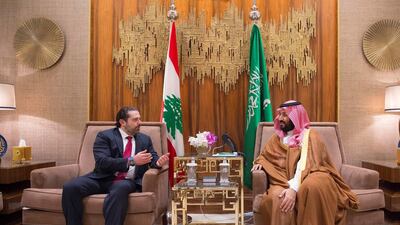Lebanese prime minister Saad Hariri held talks with Saudi Arabia's crown prince Mohammed bin Salman in Riyadh on Monday after a Saudi minister threatened unspecified actions against Hizbollah, whose support is crucial to his government.
Thamer Al Sabhan, the minister of state and Arab Gulf affairs, criticised Lebanon’s government for its “silence” regarding Hizbollah’s role in the country and told Sky News Arabia on Monday that Saudi Arabia “is determined to take all deterrent means to Hizbollah".
“We know that [the Lebanese] are under the occupation of the militia of Hizbollah, a satanic militia,” Mr Al Sabhan said.
Hizbollah, a Shiite movement that receives Iranian financial and military support, is the only political party in Lebanon that maintains a standing militia. It is considered a terrorist group by the US and Saudi Arabia, but it also has widespread influence in the government.
Mr Hariri’s office declined to provide details of the meeting with Prince Salman, saying only that it "focused on bilateral relations between the two countries and the regional developments”.
Mr Hariri posted a tweet on Tuesday suggesting that their talks had been positive.
“Dialogue with Crown Prince Mohammed bin Salman is not over, and every time we meet I am more convinced that we and the Saudi leadership are in total agreement on Lebanon’s stability and its critical place in the Arab realm,” he wrote.
The two leaders last met in May, also in Riyadh.
Mr Hariri also held talks with Mr Al Sabhan, tweeting a selfie of the pair on Tuesday and describing their meeting as “long”.
Mr Sabhan tweeted that the meeting was “lengthy and fruitful” and said there was “agreement on many things of interest to the Lebanese people”.
Randa Slim, of the Middle East Institute think tank in Washington, said that one likely topic of discussion was the possibility of further sanctions against Hizbollah and people or businesses affiliated with the group.
The Gulf Cooperation Council stepped up sanctions against Hizbollah after declaring it a terrorist organisation last year, while the US administration is currently debating tougher financial sanctions against Hizbollah, a move that received the backing of congress last week.
“I think if I follow Thamer Al Sabhan’s statement, we might see another package of sanctions from the Saudis and from the GCC targeting not just Hizbollah but people who are close to Hizbollah,” Ms Slim said.
“As they have been doing with the Americans, [Mr Hariri is] trying to ensure that if the sanctions are going to come, they do not affect the Lebanese economy,” Ms Slim said, referring to the prime minister's recent to Washington.
The United States has been encouraging Saudi Arabia to become more involved in supporting the Lebanese government as part of its strategy to counter the expansion of Iranian influence in the region, Ms Slim said. The US has continued to support Lebanon’s military as its most significant effort to provide a counterweight to Hizbollah’s influence in Lebanon, while Saudi Arabia has suspended its military support.
Hizbollah and Mr Hariri’s political bloc have long been antagonists. In 2011, Hizbollah ministers withdrew from MrHariri’s government, triggering its collapse and ending his first term as prime minister. But political and military developments in Lebanon and in Syria in the past year have forced Mr Hariri into an accommodation with Hizbollah.
Syria’s civil war has also strained the relationship between Saudi Arabia and Lebanon. Riyadh supported rebels attempting to overthrow president Bashar Al Assad while Hizbollah entered the conflict to defend his regime.
“He has to tread a fine line – he has been stung by Hizbollah in the past. He has to support the Saudi line and the American line, but he cannot cross certain red lines that would put him in opposition and see him forced out office,” Ms Slim said.
________________
Read more:
US House of Representatives unanimously passes sanctions on Hizbollah
Lebanon army chief visits Washington as Congress votes on Hizbollah sanctions
________________
Hizbollah has two members in Lebanon’s 30-member cabinet. Hussein Hajj Al Hasan serves as minister of industry and Mohammed Fneish serves as minister of youth and sport.
Neither offered a response to Mr Al Sabhan's remarks, nor did Hizbollah's office when contacted by The National.
Mr Hariri’s longstanding relationship with Saudi Arabia has been recently strained by matters outside politics as well. Mr Hariri’s father, who also served as prime minister of Lebanon, built a fortune in Saudi Arabia during Lebanon’s 15-year civil war before returning to help rebuild the country after it ended in 1990.
Saudi Oger, the construction firm that was founded by Rafik Hariri and is still owned by his family, has faced financial difficulties since last year as a result of delayed payments by the Saudi government, leaving it unable to pay employees.
Saad Hariri has also been associated in the past with Saudi princes who were not seen as allies of the current crown prince, Ms Slim said.
“In a way he was trying to repair this relationship that has been weakened because of financial issues or his relationship with Saudi princes that were viewed as potential competitors with the current crown prince,” Ms Slim said.
* Additional reporting from Reuters

